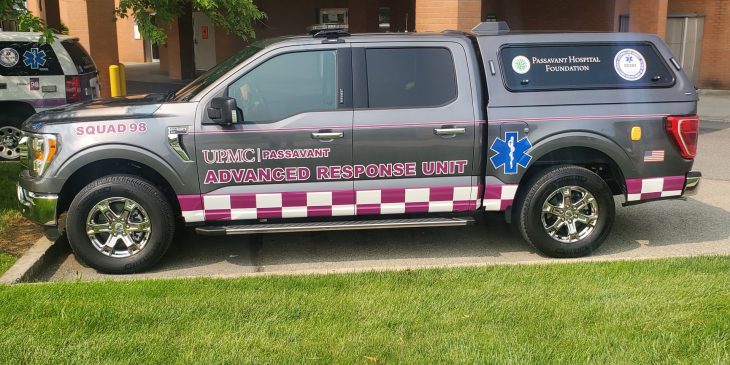On a beautiful day during National EMS Week, UPMC Passavant officials unveiled the hospital’s new advanced response unit (ARU). The vehicle is used to assist local Emergency Medical Services (EMS) personnel throughout the surrounding communities.
Before officially cutting the ribbon to introduce the new unit, Alan Martino, manager Prehospital Care and Emergency Preparation, and Betsy Tedesco, clinical director, Emergency Department, addressed the group of UPMC Passavant leaders and local EMS providers.
“I would like to thank everyone here for your support and all the EMS communities for your support,” Alan said. “We really could not have done it without you.”

The 2022 Ford F150 is replacing a 2014 Chevy Tahoe with over 100,000 miles on it, which was borrowed and licensed to UPMC Presbyterian. The vehicle is equipped with emergency medical equipment and staffed with certified advanced care providers trained to respond in various mutual aid situations requiring extra personnel. It includes the latest radio and GPS technology, new equipment, and it represents the first Department of Health licensed EMS vehicle for UPMC Passavant.
It also includes equipment provided from a Passavant Hospital Foundation grant, including an EKG monitor upgrade used to replace the borrowed monitor from the UPMC prehospital office, and a LUCAS System used to deliver high quality mechanical chest compressions to patients in cardiac arrest.
This collaborative effort for emergency services in the region addresses a need for additional support. In less than two years, the unit has responded to more than 900 emergencies and provided assistance with critical patients, transfers, and first response from Beaver, Butler, and Allegheny counties.
The ARU is staffed by several types of advanced care providers, including highly trained and experienced paramedics, pre-hospital registered nurses with intensive care and emergency experience, and STAT-MedEvac flight nurses and flight paramedics. The ARU is also dispatched to critical care incidents and for high acuity patients with challenging medical conditions and unpredictable needs.








